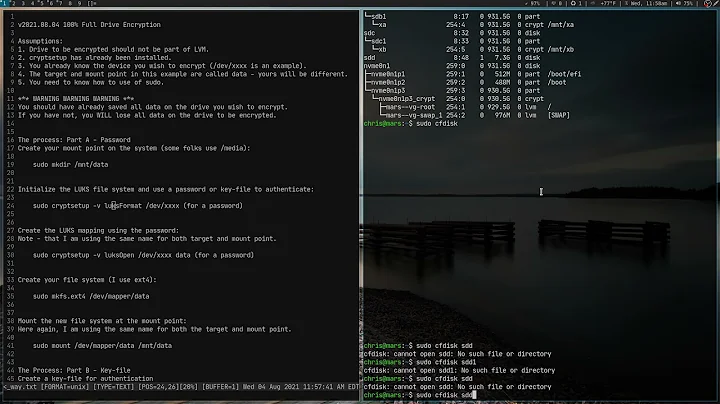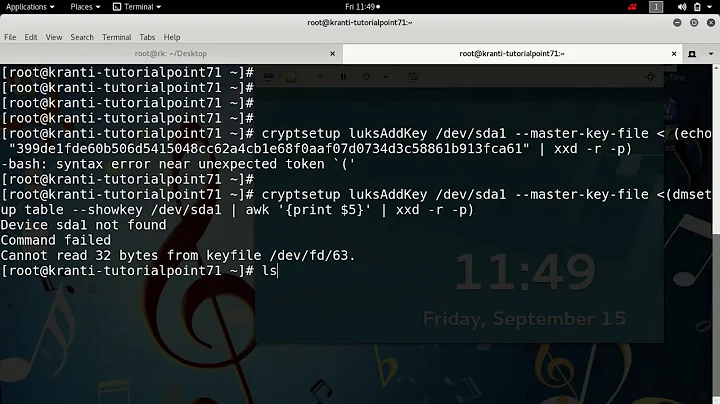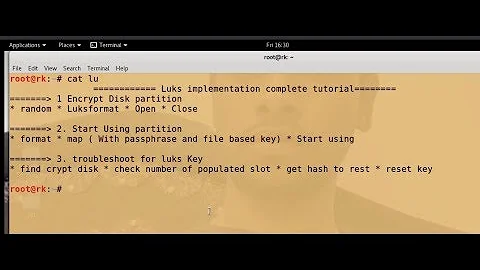"No key available with this passphrase" with a newly-created DM-CRYPT / LUKS partition
TL;DR - Check if the media is reliable; luksFormat and luksOpen don't.
The problem could be thought of in at least a few ways:
- The wrong passphrase is being provided
- The passphrase is being given in the wrong way
- Something is wrong with essential software, like cryptsetup itself.
Out of curiosity, I decided to do a complete format of the mmc drive (to "start from scratch), but with checking:
sudo mkfs.ext4 /dev/mmcblk0 -cc
mke2fs 1.44.4 (18-Aug-2018)
/dev/mmcblk0 contains a ext4 file system
last mounted on Tue Mar 5 11:30:02 2019
Proceed anyway? (y,N) y
Discarding device blocks: done
Creating filesystem with 15591936 4k blocks and 3899392 inodes
Filesystem UUID: 0ab72f40-d2a2-408d-b4ca-d5e8fcc27ec7
Superblock backups stored on blocks:
32768, 98304, 163840, 229376, 294912, 819200, 884736, 1605632, 2654208,
4096000, 7962624, 11239424
Testing with pattern 0xaa: done
Reading and comparing: done
Testing with pattern 0x55: done rs)
Reading and comparing: done rs)
Testing with pattern 0xff: done rs)
Reading and comparing: done rs)
Testing with pattern 0x00: done rs)
Reading and comparing: done rs)
Block 0 in primary superblock/group descriptor area bad.
Blocks 0 through 9 must be good in order to build a filesystem.
Aborting....
I could already see where this was going..
Since I've never formatted like that before, I formatted a second storage device (a USB stick) with checking, and it's format concluded successfully. Going through the same cryptsetup process to format and open that USB stick worked. This reveals another problem that was happening:
- The passphrase is being received in the wrong way
I suspect that luksFormat isn't doing any sanity checking to see that its data can actually be read.
As a followup, I had already done a non-quick format under Windows and it worked fine. I also performed a complete write-read-compare test and it was also a success. I have other tests to perform, just out of curiosity, but this may well (somehow) be a Linux-specific issue. I won't troubleshoot down that rabbit hole, but I'll conclude that it's important to do all the formatting and testing on the specific platform the issue is seen on.
Related videos on Youtube
Comments
-
 spiralofhope over 1 year
spiralofhope over 1 yearDoing searches, it appears that others are having more complex problems because of cipher settings, but my problem is when doing something straightforward.
Using a mostly-fresh install of Lubuntu 18.10 32bit (the kernel has been updated), I can create an encrypted partition thusly:
cryptsetup --verbose --verify-passphrase luksFormat /dev/mmcblk0 WARNING: Device /dev/mmcblk0 already contains a 'crypto_LUKS' superblock signature. WARNING! ======== This will overwrite data on /dev/mmcblk0 irrevocably. Are you sure? (Type uppercase yes): YES Enter passphrase for /dev/mmcblk0: Verify passphrase: Existing 'crypto_LUKS' superblock signature on device /dev/mmcblk0 will be wiped. Key slot 0 created. Command successful.If the password given is the letter
a, I am unable to unlock it thusly:cryptsetup --verbose luksOpen /dev/mmcblk0 crypt Enter passphrase for /dev/mmcblk0: No key available with this passphrase. Enter passphrase for /dev/mmcblk0:(I also tried zulucrypt with the same result)
Since I installed Lubuntu using its installer's encryption functionality, I can do a comparison between what my system is using natively, and what
cryptsetupmade on my mmc drive.cryptsetup luksDump /dev/sda1The relevant part appears to be:
Version: 1 Cipher name: aes Cipher mode: xts-plain64 Hash spec: sha256 Payload offset: 4096 MK bits: 512The only difference I see between the two dumps is that for my local drive, the bottom "MK bits" is 512, but for the mmc it is 256.
I don't know if it's relevant, but I also see that my local drive has two key slots and the mmc has only one. (The fact that my local drive has two key slots makes me hope/wonder if the installer put in a duplicate key in case the first is corrupt.)
A commenter asked me to try providing a passphrase this way:
echo -n 'a' | cryptsetup --verbose luksOpen /dev/mmcblk0 crypt Can't do passphrase verification on non-tty inputs. No key available with this passphrase. Command failed with code -2 (no permission or bad passphrase).
Another way to provide a password:
echo 'a' > interactive_pass cat interactive_pass | cryptsetup luksAddKey /dev/mmcblk0 No key available with this passphrase.
Using a keyfile.
I can't comprehend this. I fumbled around for a while, but stopped because I can't tell the difference between using it wrong and it having its own issues.
zulucrypt has a way to create a keyfile, but it just says
Failed To Generate Key. It's straightforward, so I'm certain I'm using it correctly (ran as root, have write permissions to the file which I'd like to create)-
 Xen2050 about 5 yearsShould definitely be able to open/unlock a device immediately after creating it, as long as the right password's being typed. Try checking using a keyfile, or perhaps
Xen2050 about 5 yearsShould definitely be able to open/unlock a device immediately after creating it, as long as the right password's being typed. Try checking using a keyfile, or perhapsecho -n "password" | cryptsetup luksOpen ... -
 spiralofhope about 5 yearsThe echo did not work (I tried two ways). I don't understand keyfiles, and my attempts have failed. I'll try a GUI tool for a keyfile.
spiralofhope about 5 yearsThe echo did not work (I tried two ways). I don't understand keyfiles, and my attempts have failed. I'll try a GUI tool for a keyfile. -
 spiralofhope about 5 yearszulucrypt can't make a keyfile. The instructions I've been trying to muddle through aren't working either, and I don't want to use a key file any way.
spiralofhope about 5 yearszulucrypt can't make a keyfile. The instructions I've been trying to muddle through aren't working either, and I don't want to use a key file any way. -
 Xen2050 about 5 yearsNot sure why you've got a "non-tty input", are you in a regular bash terminal? And if you do try a keyfile, just to verify you're creating a device & later can open it with the same passphrase, don't just cat & pipe it to cryptsetup (since the similar echo already failed) but use the
Xen2050 about 5 yearsNot sure why you've got a "non-tty input", are you in a regular bash terminal? And if you do try a keyfile, just to verify you're creating a device & later can open it with the same passphrase, don't just cat & pipe it to cryptsetup (since the similar echo already failed) but use the--key-fileoption -
 spiralofhope about 5 yearsYes I'm in a regular terminal (X, qterminal, zsh). I already experimented with some key file stuff. It's opaque to me, but I'll try harder.
spiralofhope about 5 yearsYes I'm in a regular terminal (X, qterminal, zsh). I already experimented with some key file stuff. It's opaque to me, but I'll try harder. -
 spiralofhope about 5 yearsWell shoot, the media was bad and
spiralofhope about 5 yearsWell shoot, the media was bad andcryptsetupwas being as dumb as a sack of bricks.
-
-
 Xen2050 about 5 yearsI think LuksFormat only writes 1M or 2M for it's header at the start of the device, so it must have thought that went "good enough"...? Still weird how it couldn't be opened, but a bad device leads to all sorts of problems
Xen2050 about 5 yearsI think LuksFormat only writes 1M or 2M for it's header at the start of the device, so it must have thought that went "good enough"...? Still weird how it couldn't be opened, but a bad device leads to all sorts of problems




